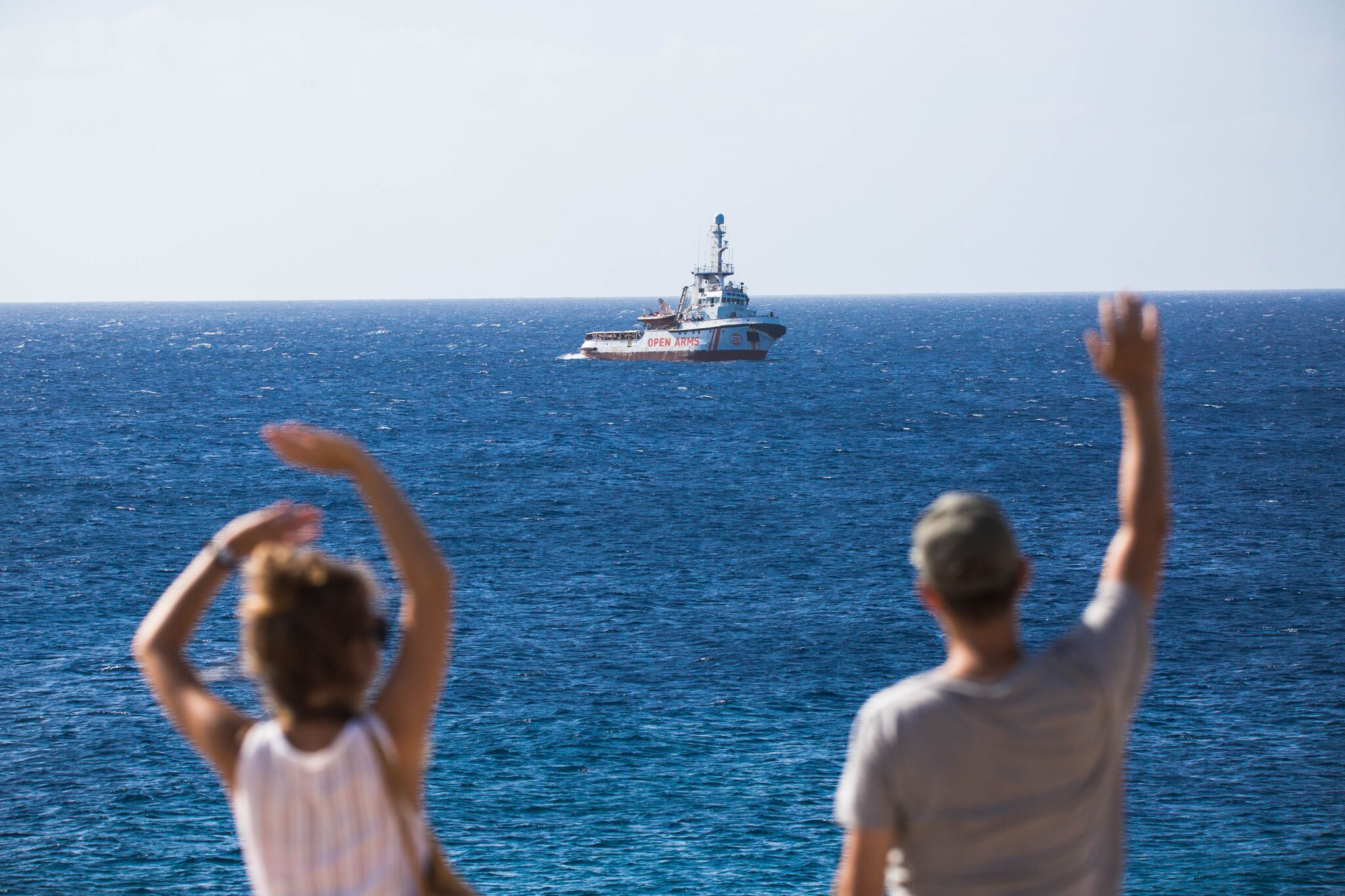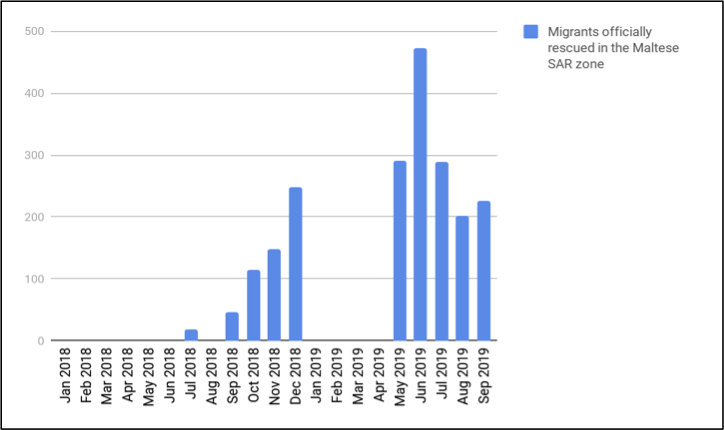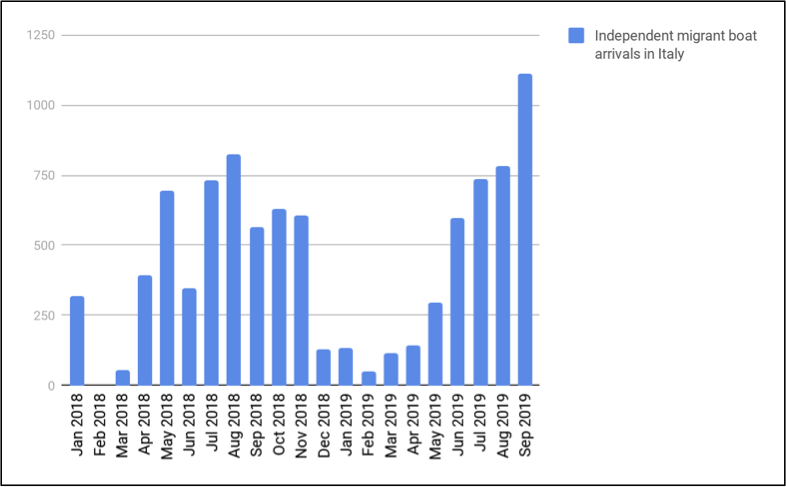 Photo: Friedrich Bungert / Sea-Watch e.V.
Photo: Friedrich Bungert / Sea-Watch e.V.
+++ Record number of Alarm Phone distress cases in the central Med +++ Ongoing Libyan mass interceptions but also continuous migrant and NGO struggles at sea +++ Over 1,000 counted fatalities in the Med this year +++ The Maltese Situation +++ Increasing autonomous boat arrivals in Europe +++
Introduction
Over the past three months, the period of time covered by this regional analysis of developments in the central Mediterranean, the Alarm Phone was alerted to 39 distress situations in that region, involving over 2,337 people. Never before has the Alarm Phone been alerted to so many boats crossing this area of the Mediterranean Sea in such short period of time. 14 of these boats were intercepted and returned to Libya. 17 boats were rescued and brought to a European harbour, including eight by NGO vessels. The fate of six boats remains unknown. Two boats capsized, and about 140 people lost their lives.
The past three months have seen important developments in the central Mediterranean region, not least the rupturing of the ‘closed harbour policy’ of Italy following the ousting of interior minister Salvini. Some of these developments were directly reflected in our own experiences. More than before, migrant boats were able to bridge quite long distances and made it into Maltese or Italian Search and Rescue (SAR) zones or even reached European territorial waters and coasts independently. Maltese and Italian coastguards, though often reluctant to cooperate with us in an adequate and professional manner, and despite delaying rescues several times, carried out several rescue operations after we had alerted them to distress cases, in particular over the past weeks. Between September 16-20 alone, about 289 individuals on five boats were rescued by European coastguards after we had informed them – four to Malta and one to Italy.[1] In terms of crossings, the month of September has been the busiest so far this year with about 2,400 individuals arriving either in Malta or Italy.
This analysis reflects on some of these developments in the central Mediterranean region. It first highlights the ongoing mass interceptions to Libya that are considerably supported by EU actors, and then turns to the ongoing mass dying at sea, with the official (but inaccurate) number of deaths having exceeded the 1,000 mark. After briefly pointing to the vital rescue operations carried out by NGOs, often after being informed by the Alarm Phone, it discusses the situation for migrants in Malta before highlighting the increase in independent boat arrivals in Europe.
1. Libyan Mass Interceptions
Despite the recent uptake in migration via the central Mediterranean, the number of successful crossings is still low in comparison to previous years, and amounts to less than half of 2018’s crossings, the year when sea crossings via the central Mediterranean first drastically declined. The reason for this decline is, of course, the concerted European-Libyan effort to prevent boats from reaching European SAR zones and the refusal of EU coastguards to rescue in the extended Libyan SAR zone. Many boats that reached out to us were intercepted by the so-called Libyan coastguards, often after they were notified by European authorities. In order to detect boats and prevent crossings, Europe has intensified its aerial surveillance, for example through assets of the military operation Eunavfor Med, an operation that was recently extended by another six months. Over the five busiest days for the Alarm Phone, September 16-20, five boats that called us were intercepted, meaning that about 431 people were returned to inhumane detention and torture camps in the Libyan warzone.
When European coastguards and authorities reject responsibility for particular distress situations, there is no alternative than to also inform the so-called Libyan coastguards. However, their behaviour remains erratic. Very frequently they cannot be reached at all or they react with great delay.[2] It often takes European authorities to pressurise them into intercepting boats.[3] In a recent report, Eunavfor Med suggests that RCC Tripoli has been able to react to 50% of all distress situations in their area of responsibility. This is a confession of failure given that RCC Tripoli is often referred to as the ‘competent authority’ to coordinate SAR operations. In light of this, European authorities continue to informally assist the Libyan coastguards which in turn means that an independent RCC Tripoli does not exist.[4]
Concerted EU-Libyan mass interception campaigns continue regardless of the violence experienced by people stuck in Libya. On the 2nd of July, gruesome news reached us from the Tajoura detention centre near Tripoli in Libya when Haftar’s Libyan National Army conducted an airstrike and killed at least 53 detained migrants and injured over 130.[5] According to several testimonies, guards shot at those trying to escape the scene. Many of the victims had been intercepted at sea and returned to Libya. On the 19th of September, a man was shot dead by the Libyan authorities after he was disembarked. Just like all the others whose escape was thwarted, he refused to be imprisoned once more. When he tried to run away, he was shot by Europe’s Libyan allies – killed for his will to be free.[6]
2. Death at Sea
Also at sea, the dying has continued. Although official statistics speak of about 1,040 fatalities in the whole of the Mediterranean this year, we know that the mark of 1,000 border victims has been surpassed long ago, as many who go missing are never counted and accounted for in official statistics. On the 4th of July, a shipwreck occurred near the Tunisian coastal town of Zarzis – over 80 people died, only four people survived.[7] On the 25th of July, about 150 people lost their lives off the coast of Libya.[8] On the 12th of August, a boat was spotted drifting in the central Mediterranean – one person survived while 14 others did not.[9] The sole survivor testified later that they had seen many boats and helicopters during their 11 days at sea – nobody intervened and they were left to die. On the 18th of August, a fisherman in Libya told us convincingly about a shipwreck that he witnessed. He and his colleagues rescued three people but over 100 fatalities are feared.[10] On the 27th of August, the Alarm Phone was called by a group of people in urgent distress near Libya.[11] Many people did not survive – at least 40 people lost their lives.[12] On the 17th of September, a boat that left Tunisia sank off the coast of Sfax, at least 14 people died. A day later on the 18th of September, another shipwreck occurred near Tunisia, this time near Djerba, with at least four people drowning.[13]
3. NGO Struggle at Sea
Over the past three months, several boats in distress that reached out to the Alarm Phone were rescued by the humanitarian fleet. On the 4th of July, 54 people in distress who called us were found and rescued by Mediterranea’s sailing boat Alex. Between August 1 and 10, three boats that alerted us were eventually found by the NGO Open Arms and its passengers brought to Italy.[14] SOS Mediterranée’s Ocean Viking rescued 80 people who had called us on August 9.[15] On the 8th of September, the Ocean Viking rescued another 50 people who had reached out to the Alarm Phone.[16] On the 9th of September, 34 people who contacted us were later rescued by the sailing boat Josefa and then transferred to the Ocean Viking.[17] On the 19th of September, the Ocean Viking carried out another rescue of a boat that had informed the Alarm Phone, rescuing 36 people.[18] Besides rescues with Alarm Phone involvement, the NGOs rescued hundreds of other travellers in distress over the past three months.[19] Frequently, the rescued and the crews had to endure cruel stand-offs as European authorities refused to swiftly allow them to disembark. Several of the NGO ships were confiscated and crew members fined.
4. The Maltese Situation
The Malta Agreement
On the 23rd of September, during the meeting of several EU interior ministers in Malta, a temporary agreement was found concerning the relocation of rescued migrant travellers. Though much remains unclear, if enacted, the agreement would presumably end the undignified stand-offs along European coasts, in which NGOs waited for days or weeks until permissions to disembark were granted. This much-praised ‘breakthrough’ in terms of migrant relocation hid the fact that much of the Malta agreement intends to further outsource European borders, for example by further strengthening the so-called Libyan coastguards and Europe’s collaboration with them.
In light of this Malta meeting, the Alarm Phone issued a collective statement to demand the immediate release of all NGO rescue ships:[20]
The EU border regime blocks all safe legal passages and forces refugees and migrants to move on hidden routes and travel on unseaworthy boats. Shame on you.
The EU is unwilling to organise a proper sea-rescue program for those affected by their policies. Instead, illegal push/pull-back collaboration between aerial assets of the EU and Libyan forces is a daily practice. Shame on you.
When individuals and organisations from the civil society intervene to rescue lives at sea, the EU and its member states criminalise them. While people are dying and drowning, the EU and its member states keep life-saving rescue ships confiscated. Shame on you.
We demand:
— Immediate de-confiscation of all civil rescue ships in Italy!
— Immediate end to the EU collaboration with Libyan forces!
— No continued efforts to criminalise sea rescue!
— Open harbours in Italy and Malta, immediate disembarkation after rescue!
— Quick relocation and distribution of refugees and migrants according to their wished destination countries and particularly in collaboration with solidarity and sanctuary cities all over Europe!
From a Warzone into Detention
Even if a (temporary and fragile) relocation mechanism was agreed upon in Malta, many of the migrants there will not be able to leave the island-nation any time soon. After reaching Malta by boat, they have to endure the entire relocation procedure while being detained. The official explanation for these illegal detention measures is that an obligatory health check has to be carried out, but the lack of adequate forms of accommodation is the de facto reason.[21] The newly arrived suffer tremendously from the slow relocation procedure, not least as the selection process is completely intransparent and inconsistent, and as obstacles are created to impede access to information or legal support. No information about relocation criteria and procedures are given so that the detained have to wait in uncertainty.
Though countries of destination could be chosen in terms of family ties, the language spoken, or the availability of adequate protection, EU member states follow other, wholly intransparent, criteria. Men from west African countries, for example, are by and large not accepted for relocation, which also applies to unaccompanied minors. They are the ones who are being left behind in Malta as not all those who were rescued by NGO vessels are later relocated. They do not receive any information about the reason for the refusal to relocate. Protests against inhumane conditions are increasing in Malta, for example in the detention camps of Safi Military and IRC Marsa, where detainees demand their “Freedom!” and the right to be heard.[22]
The making of a Terrorist Pirate
Malta is currently the place of a political trial against three teenagers – 15, 16 and 19 years old. They were part of a group of 108 people who were rescued on March 26 this year by the merchant vessel El Hiblu 1 on its route to Tripoli. A European military aircraft alerted the commercial tanker as the so-called Libyan coastguards were not operative. When the migrants who had escaped Libya realised that they were returned back to their place of torment and an active warzone, they desperately demanded of the crew to change course and sail to Europe.[23] The teenagers, the “El Hiblu 3”, who were negotiating with the crew due to their language skills, rescued these 108 people, among them women and children, from being refouled back to Libya. Now they stand trial before the Maltese court, accused of having engaged in “terroristic” activities. The prosecution wants to turn the three into terrorist pirates who could face sentences up to 30 years in prison. The concrete charges against the “El Hiblu 3” are expected to come soon.
5. Continuous Migrant Struggles to Escape
About 2,400 people succeeded in crossing the central Mediterranean and reaching Europe in September 2019. This is by far the largest number of people this year and about 2.5 times the arrivals of September 2018.[24] Many of the arrivals were rescued either within European SAR zones or territorial waters, meaning that migrants are aware that they have to travel much further to avoid being intercepted and returned back to Libya. The below chart points to the increase this year in boats rescued within the Maltese SAR zone.
Many boats reach Italy even independently. According to some sources, these autonomous arrivals constitute around half of all arrivals in Italy. In September alone, 44 boats reached Italy in this way.
In the first week of September alone, about 340 individuals landed in Italy by themselves.[25] Boats depart not merely from Libya but also from Tunisia and Algeria – on September 28, about 250 people on eleven boats coming from Algeria reached Italy independently. The number of crossings may have decreased overall but the many independent arrivals highlight the continuous struggle of migrant travellers to escape.
Footnotes:
[1] See for other examples: https://twitter.com/alarm_phone/status/1147854688521523200;
https://twitter.com/alarm_phone/status/1154735127228014594;
https://twitter.com/alarm_phone/status/1150352742990450689
[2] https://twitter.com/alarm_phone/status/1170767998392684544,
https://mobile.twitter.com/alarm_phone/status/1166309705716838405?s=20
[3] EUNAVFOR MED Operation Sophia, 2018, “Monitoring of Libyan Coast Guard and Navy”, annex C, online, available at https://g8fip1kplyr33r3krz5b97d1-wpengine.netdna-ssl.com/wp-content/uploads/2019/02/ENFM-Monitoring-of-Libyan-Coast-Guard-and-Navy-Report-October-2017-January-2018.pdf; EUNAVFOR MED Op SOPHIA – Six Monthly Report 1DEC2018 31MAY 2019; https://www.buzzfeednews.com/article/marcusengert/operation-sophia-report-migrants-libya-warning?fbclid=IwAR3qjHPEc5KY1GIqrxO_dRQE6j6f_U1NN87rLIQcJZ4ChbyuJ4xP0FRJBkM, 15.09. 06:43, p.6
[4] EUNAVFOR MED Op SOPHIA – Six Monthly Report 1DEC2018 31MAY 2019; https://www.buzzfeednews.com/article/marcusengert/operation-sophia-report-migrants-libya-warning?fbclid=IwAR3qjHPEc5KY1GIqrxO_dRQE6j6f_U1NN87rLIQcJZ4ChbyuJ4xP0FRJBkM, 15.09. 06:43, p.4
[5] https://apnews.com/2b6635eb3f1045acad5fc8d0d1710ded
https://www.theguardian.com/world/2019/jul/03/air-strike-kill-libya-tripoli-migrant-detention-centre
[6] https://twitter.com/MSF_Sea/status/1174821698274832386
[7] https://twitter.com/alarm_phone/status/1146729719620079617
[8] https://www.theguardian.com/global-development/2019/jul/25/up-to-150-people-may-have-died-in-shipwreck-off-libya-says-unhcr
[9] https://timesofmalta.com/articles/view/i-survived-14-others-died-migrant-rescued-from-dinghy-describes-ordeal.728903
[10] https://twitter.com/alarm_phone/status/1163460517433958405
[11] https://mobile.twitter.com/alarm_phone/status/1166309705716838405?s=20
[12] https://www.infomigrants.net/en/post/19140/at-least-40-feared-dead-or-missing-in-shipwreck-off-libya-according-to-unhcr
[13] https://twitter.com/alarm_phone/status/1174263649902501893
[14] https://mobile.twitter.com/alarm_phone/status/1160015528292999169
https://twitter.com/alarm_phone/status/1160085511849041920?s=09
[15] https://twitter.com/alarm_phone/status/1159767621539106816?s=09
[16] https://twitter.com/alarm_phone/status/1170767998392684544
https://apnews.com/32deea3d8deb4f20a0930080d0ce9f4a
[17] https://twitter.com/alarm_phone/status/1171329328551989248
https://www.aljazeera.com/news/2019/09/charity-ship-completes-rescue-34-migrants-libya-190910102411250.html
[18] https://twitter.com/alarm_phone/status/1174794610427777034
[19] https://twitter.com/seaeyeorg/status/1156500710009298945;
https://twitter.com/msf_sea/status/1160532027021680640;
https://twitter.com/SOSMedIntl/status/1173928869621096448;
https://twitter.com/SOSMedIntl/status/1174391187609923585
https://www.infomigrants.net/en/post/19096/mission-lifeline-charity-rescues-100-migrants-at-sea;
https://mediterranearescue.org/en/news-en/morning-28-of-august-the-mare-jonio-has-rescued-about-a-hundred-people/
[20] Signed by: Sea Watch, Mediterranea Saving Humans, Welcome to Europe-Italy, Borderline-Europe, INURA, Ajuntament de Barcelona-Global Justice Department and WatchTheMed Alarm Phone https://alarmphone.org/en/2019/09/23/de-confiscation-of-all-rescue-ships-now/?post_type_release_type=post
[21] https://www.maltatoday.com.mt/news/national/97309/ongoing_detention_of_asylum_seekers_for_medical_reasons_is_unlawful_ngos_say
[22] https://timesofmalta.com/articles/view/migrants-demand-freedom-in-angry-protest-at-safi-barracks.732721
[23] https://magazine.atavist.com/the-rescue-mediterranean-migrants-malta-europe-crisis
[24] https://www.infomigrants.net/en/post/19632/migrant-arrival-numbers-in-italy-up-for-september-compared-to-last-year;
https://www.infomigrants.net/en/post/18963/ghost-landings-continue-in-italy;
https://reliefweb.int/report/italy/italy-sea-arrivals-dashboard-september-2018
[25] https://www.nytimes.com/2019/09/23/world/europe/migration-crisis.html

